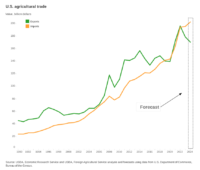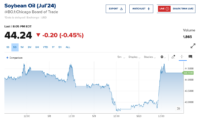Bloomberg's Clarice Couto reported this past Friday that "a surprising tax change in agriculture powerhouse Brazil has the potential to make soy grown in the world’s largest bean exporter less…
Grain Deal Control Center Launches to Monitor Exports, As Obstacles to the Agreement Linger
Bloomberg writers Megan Durisin and Archie Hunter reported earlier this week that, “Now that Ukraine’s grain-export deal has been signed, all eyes are on clearing a major obstacle: freeing the scores of ships stuck there since February.
“As many as 100 vessels carrying grain and agricultural products were trapped in Ukrainian ports when Russia’s invasion began, and seeing them sail would mark a first step in revitalizing seaborne trade. But even with a deal, traders say freight for new sales is difficult to nail down, with risks to insurers and shippers still lingering.”
In addition, Reuters writer Jonathan Saul reported that, “Finding enough seafarers willing to sail ships stuck inside Ukraine’s ports is set to pose a major challenge to the proposed grains corridor designed to ease an international food crisis.”
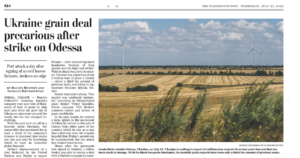
Dalton Bennett and Isabelle Khurshudyan reported in Wednesday’s Washington Post that, “Ukraine’s priority is exporting the 20 million tons of grain from last year’s harvest that has been stuck in storage. Alternative routes — through river ports on the Danube or by rail or road to Poland — have created logistical headaches because of long queues and the high cost of fuel. With its Black Sea ports blockaded, Ukraine was exporting about 2 million tons of grain a month — about a third the amount of previous years, according to Agriculture Minister Mykola Solskyi.”
And New York Times writer’s Maria Varenikova and Matthew Mpoke Bigg reported this week that, “But Ukraine’s farmers also need trade to start again quickly. Ukraine’s agriculture minister, Mykola Solskyi, said that there were $10 billion worth of grain stored in Ukraine and the incoming harvest would add a further $20 billion to that amount.”
Elsewhere, Bloomberg writers Archie Hunter and Megan Durisin pointed out this week that, “But the dangers posed by mines and Russian missile attacks is making the insurers, banks and brokers hesitant to make deals.”
Also this week, Bloomberg writers Firat Kozok and Onur Ant reported that, “Turkey said grain exports from Ukrainian ports could resume within a week and reach 25 million tonnes by the end of the year, after it brokered a deal between Kyiv and Moscow that eased fears of a global food crisis.
“Exactly when exports halted by Russia’s invasion would begin will be determined by logistical groundwork, Turkish President Recep Tayyip Erdogan’s spokesman, Ibrahim Kalin, said in an interview on Tuesday.”
Reuters writers Aleksandar Vasovic and Pavel Polityuk reported yesterday that, “Ukraine’s navy confirmed on Wednesday that work had started at three Ukrainian Black Sea ports aimed at preparing for the resumption of grain exports.”
And Elvan Kivilcim and Jared Malsin reported in today’s Wall Street Journal that,
Turkey’s defense chief unveiled a new control center where Russian, Ukrainian, Turkish and United Nations officials are set to monitor exports of Ukrainian grain through the Black Sea under an agreement reached last week, and signaled Turkey’s intent to make sure that shipments start moving.
Today’s article explained that, “Twenty people representing each of the four parties to the agreement will work in the center, Turkish officials said.
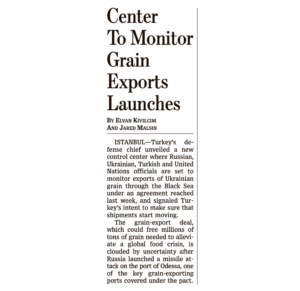
“An inspection team, also including officials from all three countries and the U.N., is also being prepared to make sure ships traversing the route aren’t carrying military supplies.”
Despite the forward movement, Reuters News reported yesterday that, “Russian Deputy Foreign Minister Andrei Rudenko said on Wednesday that a Turkish-brokered deal to unblock Ukrainian grain exports on the Black Sea could collapse if obstacles to Russia’s agricultural exports are not promptly removed, Interfax reported.”
While a separate Reuters article yesterday indicated that, “Russia cannot be trusted to honour an agreement to allow the export of Ukrainian grain from Odesa, the Polish prime minister said on Wednesday, after Moscow launcehed a missile strike on the Black Sea port.”
More broadly, Reuters writer Pavel Polityuk reported yesterday that, “Ukraine’s grain exports in the first 26 days of July, the first month of the 2022/23 season, were down 47% year on year at 1.23 million tonnes, the agriculture ministry said on Wednesday.”
With respect to Russian exports, Reuters indicated yesterday that, “The Russia-focused Sovecon agriculture consultancy has raised its forecast for the country’s July-June 2022/2023 wheat exports by 300,000 tonnes to a record high of 42.9 million tonnes, it said on Wednesday.”
In news regarding market prices, Dow Jones writer Kirk Maltais reported yesterday that, “Concerns about the Russia-Ukraine export corridor deal supported higher prices in pre-market trading, but they eventually faded as sentiment returned towards Ukrainian vessels being allowed to leave the Black Sea.”
And Bloomberg writer James Poole reported today that, “Soybeans climbed for a fifth day, the longest rising streak in over two months, on concerns that heat and dryness in August will hurt North American oilseed crops, just as similar weather wilts sunflowers in Europe.
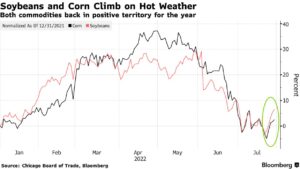
“Prices advanced to the highest intraday level in more than two weeks. Corn, also vulnerable to the heat and lack of rain, increased for a fourth day.”






